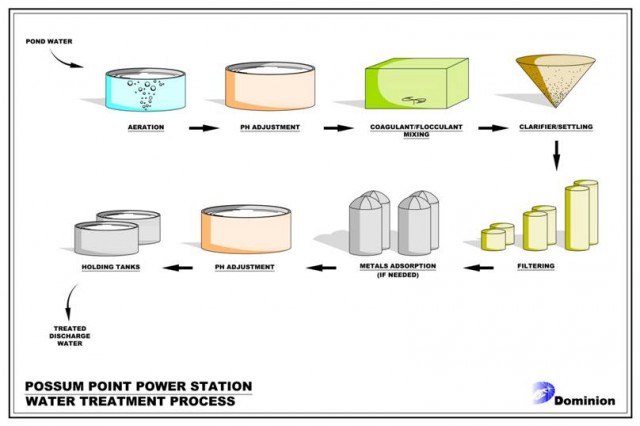At the top of the hill overlooking the Possum Point Power Station you get a clear view of the Potomac River.
Helicopters are buzzing in the air near Quantico Marine Corps Base.
There’s also a large pond below the hilltop, one of five that contain the deadly heavy metals arsenic, boron, and chromium to lead, mercury, selenium, and zinc, all sitting at the bottom of the pond. The heavy metals combine to form coal ash — a byproduct created when coal was burned at Possum Point to generate electricity from 1947 to 2003.
Environmental engineers today lead a team of reporters around a $35 million operation that will pump water and ash from the slurry pond. The treatment system will then remove the coal ash from the water, and then treat the water to meet standards set by Virginia’s Department of Environmental Quality, and then release it into Quantico Creek where it will flow into the Potomac River and the Chesapeake Bay.
[ngg_images gallery_ids=”607″ display_type=”ds-nextgen_royalslider”]
The first discharge of treated water from Possum Point will occur Monday. Dominion Environmental Manager Jason Williams said this is the most “unprecedented” water treatment system he’s seen in his 15 years working in the environmental clean up business.
The work to treat the water has already begun, following approval from Virginia’s Water Control Board in Janurary. It will continue through every day, 24 hours a day until April 2018. Two crews with 16 to 20 people will work to complete the work in shifts.
The water treatment system constructed on the hilltop is a massive network of tanks, pipes, pools, filters, and large bagged containers called Geotubes. The multi-step process is continually monitored each hour to make sure the water that’s being scrubbed of particulates not only meets state standards but exceeds them, as Dominion has promised to do.

1. Water is pumped from a coal ash pond into the an aerator. Air is blown into the water to loosen up coal ash particulates in the water.
3. Chemicals are added to the water, including polysaccharides and a coagulant. The chemicals allow the coal ash sediment to bond to form a mass that can be easily removed from the water.
3. Water then flows into a Geotube that separates coal ash sediment from the water and removes them. The water moves on for treatment. The sediment is trapped in one of eight Geotubes, or large bags that will be hauled to a landfill in King George County, Va.
Trucks will haul away about one Geotube bag per week. None of the hazardous materials will be shipped out on rail cars along the railroad that runs in front of Possum Point Power Station.
4. The water flows into sand filters where more coal ash sediment is trapped.
5. The water flows into large tanks where, similar to an in-home water filtration system, media inside the tanks separates the containment from the water.
6. The water is pumped from the large media tank into a 100,000-gallon pool where it is tested each hour.
7. If the water does not meet clean standards, it is pumped back from the pool into a large series of tanks where a process called “weak acid cation exchange” occurs, and the water is treated again.
“This serves as our insurance policy,” said Williams.
8. When the water is clean, workers open a valve, and the water flows from the treatment site down a large pipe and out into the Quantico Creek.
Two third-party companies will be responsible for testing the water before it flows into Quantico Creek. The results of each week’s testing are to be posted to Dominion’s website each Friday. This state requirement is also “unprecedented,” said Williams.
New federal rules for the closure and capping of coal ash ponds across the U.S. enacted in 2014 prompted Dominion to move quickly on this project. Coal ash from five ponds at Possum Point will be moved into one clay-lined pond, Pond D. All water will be drained from Pond D and a cap will be placed over the remaining coal ash. The closure process is similar to closing a landfill.
A series of wells have been bored into the sludge in the final pond, known as Pond D. Once the pond’s surface water has been drained, these wells will help bring more water to the surface that had been trapped into the coal ash.
About 200,000 cubic yards of coal ash remain at Possum Point. The amount of water in need of treatment would fill 360 Olympic-size swimming pools.
Dominion will be responsible for monitoring the area around the closed coal ash pond for up to 30 years after the work is completed. Williams says the four other areas around Possum Point that once contained coal ash ponds will be restored to their original grade, natural vegetation replanted, and then monitored, but not quite for 30 years.
All of the work to treat and release the water is being conducted on privately-owned Dominion property. There was an increased police presence around the power station on Tuesday. A Dominion official said they were there because there had been unwanted “visitors” to the site in recent days.



